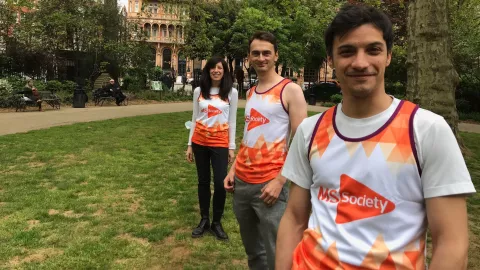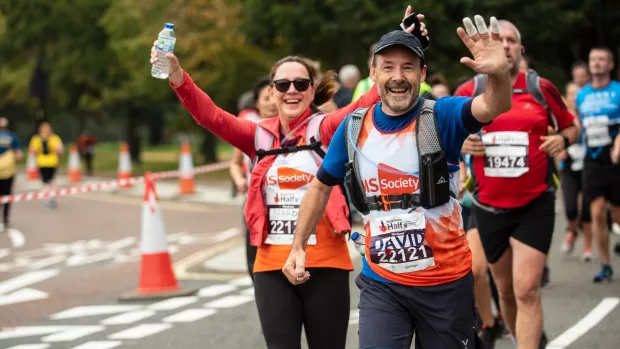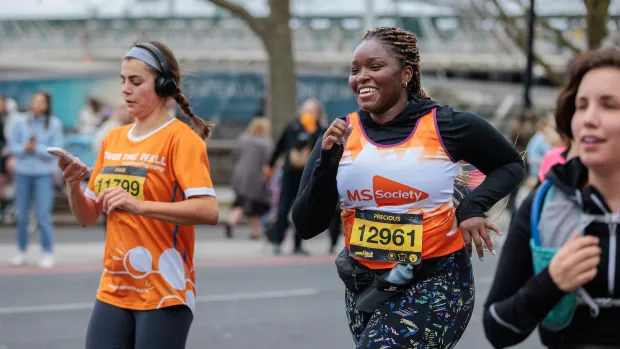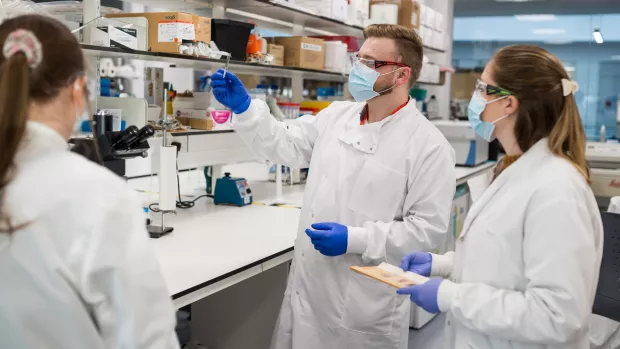
The scientists racing for MS research
A dozen MS researchers will collectively run 3 marathons at this year’s Edinburgh Marathon Festival (EMF).
Three teams of four researchers, from University College London (UCL), will take on the Hairy Haggis Team Relay virtually on 30 May. They’re aiming to raise funds for vital research across the UK.
Tom's story
Dr Tom Williams, a Clinical Research Fellow at UCL, is one of the scientists taking part. He’s currently working on the landmark MS-STAT2 trial and tells us why he’s joined the running challenge.
As a junior doctor getting into research, you’re quite naïve to the role of funding initially. But when you get involved, it becomes clear that it's time consuming and expensive to do trials and research well.
After working in research for a couple of years, the penny really drops that without people raising the funds, and the MS Society doing all of the work they do for MS research, there wouldn’t be any progress.
Working on the MS-STAT2 trial
It’s really rewarding to be working on the MS-STAT2 trial because there aren’t many treatment options for secondary progressive MS. Siponimod (Mayzent) was the first treatment to be approved for over 15 years.
So there’s definitely a big unmet need with treatments for secondary progressive MS.
There’s a quite large team working on the MS-STAT2 trial. Around the UK there are 100 staff working at any given time, so a lot goes into making this trial possible.
Running for MS research
It was my colleague Alberto Calvi who first mentioned taking part in EMF. We all keep reasonably fit in our team, so Alberto was thinking the relay would be a manageable challenge for us with some training. The challenge just snowballed from there and now we have three different teams of researchers taking part.
Our main approach to training has been to base it on some low level competition between the research nurses, doctors and professors. It’s worked well as a way of getting everyone involved.
With the pandemic, it’s been good to have some positive motivation to help us get active again.
Stephen's story
Stephen Ritchie, from Edinburgh, was diagnosed with MS in 1997 and has been taking part in the MS-STAT2 trial for two years. The MS-STAT2 trial is a double-blind trial, meaning half the participants will take the drug and the others will be on the placebo (dummy drug). He tells us more about why the money that Tom’s helping to raise is so important.
I was uplifted and hopeful that the MS-STAT2 trial trial was taking place and, honestly, desperate to take part in it.
As someone living with progressive MS, it’s so important that trials like this are happening. To have the chance to be a part of the trial was immense.
Volunteering to be part of MS research
Physically, my walking isn’t as good as it was but I’ve definitely noticed improvements with my cognition.
I don’t know if I’m taking the drug or I’m on a placebo. But I’ve played chess on and off for most of my life and since being on the trial my score has gone up by 600 points.
You’ve got to be able to concentrate, for sometimes a couple of hours at a time, so to see such a big improvement in my chess grading has been really significant.
When playing chess, you wouldn’t normally expect to beat someone who’s just 200 points above you.
I’m so grateful for be part of the trial and thankful to everyone involved who make MS research possible.
Stopping disability progression
It may not be this drug, it may not even be the next drug, but we will get to a point where there is a drug to help stop disability progression.
And when that does happen, there would be no words to describe it. It would mean so much to be able to turn things around for people with progressive MS and have a treatments that stop your MS getting worse.
The MS-STAT2 team are looking for more people to take part in the trial. If you’re living with secondary progressive MS and would like to take part you can find out more on the UCL website.




